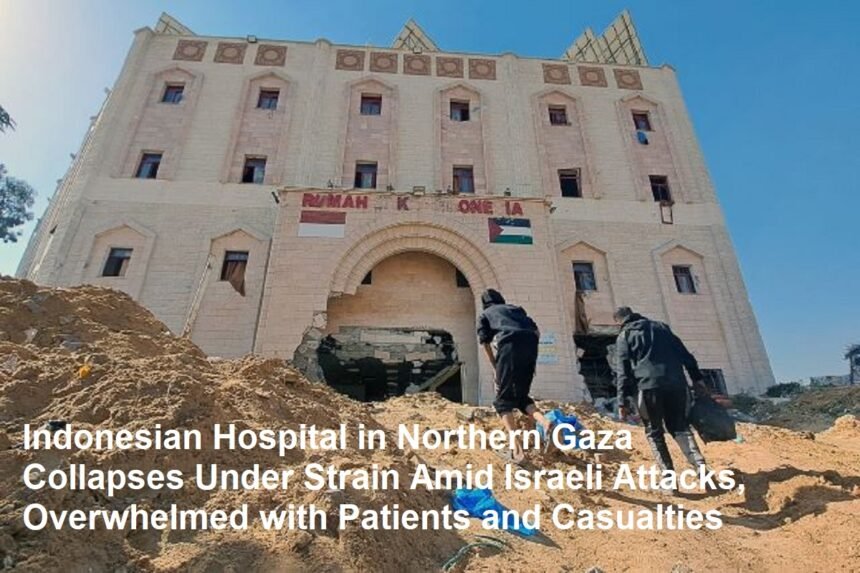On Wednesday, May 14, 2025, an Indonesian-run hospital located in northern Gaza faced a catastrophic collapse in its capacity to provide medical care, overwhelmed by the influx of dozens of patients and bodies resulting from the brutal Israeli attacks in the region. This tragic development has intensified the humanitarian crisis in Gaza, highlighting the severe consequences of ongoing conflict and the urgent need for international assistance and intervention.
The hospital, which serves as a critical healthcare facility for the local population, was inundated with casualties following a series of intense Israeli strikes. The attacks, part of a broader military operation, caused widespread destruction and loss of life, leaving many injured and in desperate need of urgent medical attention. The facility’s collapse under such pressure underscores the fragility of healthcare infrastructure in conflict zones and the immense challenges faced by medical personnel working under extreme conditions.
Medical staff at the Indonesian hospital worked tirelessly to treat the wounded and manage the increasing number of fatalities. However, the sheer volume of patients quickly exceeded the hospital’s capacity, leading to overcrowded wards, shortages of medical supplies, and a lack of adequate space to accommodate the deceased. The situation was further exacerbated by damage to the hospital’s infrastructure, which hampered its ability to function effectively.
The collapse of the hospital’s capacity has had dire consequences for the people of northern Gaza. Many critically injured patients faced delays in receiving life-saving treatment, while families struggled to cope with the loss of loved ones amid the chaos. The psychological toll on both survivors and healthcare workers has been profound, with trauma and grief permeating the community.
This incident has drawn international attention to the humanitarian plight in Gaza, where healthcare facilities are often caught in the crossfire of conflict. The Indonesian hospital’s crisis is emblematic of the broader challenges faced by medical institutions in the region, which operate under constant threat of attack, limited resources, and overwhelming demand. The situation calls for urgent humanitarian aid, including medical supplies, personnel support, and infrastructure repair.
International organizations and governments have expressed concern over the deteriorating conditions in Gaza and the impact on civilian populations. Calls for ceasefire and protection of medical facilities have been reiterated, emphasizing the need to uphold international humanitarian law and ensure safe access to healthcare for all affected by the conflict.
The Indonesian government has condemned the attacks and expressed solidarity with the Palestinian people, pledging support for humanitarian efforts and the reconstruction of critical infrastructure. The collapse of the hospital has also galvanized local and international NGOs to mobilize resources and coordinate relief operations aimed at alleviating suffering and restoring essential services.
The broader geopolitical context of the Israeli-Palestinian conflict continues to complicate efforts to achieve lasting peace and stability. The recent escalation of violence, including the attacks on Gaza and the resulting humanitarian crisis, underscores the urgent need for renewed diplomatic engagement and conflict resolution initiatives.
In conclusion, the collapse of the Indonesian hospital in northern Gaza on May 14, 2025, amid brutal Israeli attacks, represents a tragic chapter in the ongoing conflict. The overwhelming influx of patients and casualties has exposed the vulnerabilities of healthcare systems in war zones and the urgent need for international support. As the humanitarian crisis deepens, the global community faces a critical moment to respond with compassion, aid, and a renewed commitment to peace and justice for the people of Gaza.









